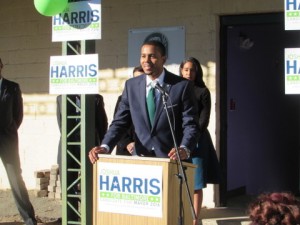
Joshua Harris is one of 13 candidates, so far, running for the Democratic nomination to be mayor of Baltimore. (Photo by Roberto Alejandro)
Community development must focus on people first, not structures, and the city must begin to incorporate more feedback from residents if it is to avoid the disconnect between government and citizens that helped feed last April’s unrest, said Joshua Harris, a recent entrant into the race for the Democratic nomination for mayor of Baltimore.
Harris, a Chicago native, came to Baltimore almost four years ago, having worked in various communications capacities since graduating from Augsburg College in Minneapolis, Minnesota, in 2008, with a degree in communications. Harris was the first in his family to graduate from college, and since arriving in Baltimore, Harris has co-founded a non-profit, Hollins Creative Placemaking, that seeks to use art as a catalyst for urban renewal while limiting displacement of existing residents. In addition, he worked on the campaign of Del. Charles Sydnor (D-Baltimore County), for whom he also served as a legislative aide in 2015, and joined the board of directors of the Southwest Partnership, an organization of various community associations that works on community development and urban renewal issues in southwest Baltimore.
Harris, who currently works in communications for the international headquarters of the Alpha Phi Alpha fraternity, serving as their Capital Hill liaison since 2012 and as the managing editor of the organization’s magazine, Sphinx, announced his candidacy for mayor on Nov. 15, and recently sat down with the AFRO to discuss his ideas for Baltimore City.
In his announcement speech, Harris spoke of last April’s unrest, and asked whether it could have been prevented had the city been listening to communities like Sandtown-Winchester before rioting broke out.
“, the traditional and older model is send a message-receiver, and I also believe that that is the common mode that the city operates under . . . we are the sender, we want to get out, and you receive it. We also now have to incorporate the feedback,” said Harris.
This incorporation of feedback, said Harris, is key if city programs aimed at strengthening communities are to be effective, since programming developed without community feedback often suffers from a lack of community participation, guaranteeing the failure of such efforts.
But the lack of feedback from the persons such programming is intended to reach is tied to another concern, one seemingly at the core of Harris’s governing philosophy, that development in Baltimore City tends to focus on structures and infrastructure, rather than people.
“ are actually a small part, and should be the last component. We should first focus on developing the people in our city, and then infrastructure will come along,” said Harris.
That requires fostering a sense of pride and belonging for all city residents, said Harris, which then allows for the persons living in Baltimore’s various communities to be the catalyst for the city’s development themselves.
One idea Harris proposed in this vein was to create local food distribution centers in areas of Baltimore’s without easy access to fresh fruits and vegetables, and to hire local residents to run the centers while paying them a living wage. This would address the problem of healthy food access while also creating jobs, which, if targeted at those who are chronically unemployed due to criminal histories, could have an impact on crime.
“We know that an individual’s employment drastically reduces their propensity to return to crime. And with living wage jobs we can have an immediate impact on crime reduction in our city,” said Harris.
Community participation was central to a number of Harris’s proposals, such as implementing cultural competency training for police officers that would involve residents in the training process itself. Another arena in which this approach came to bear was in the realm of education.
While Harris believes that per pupil spending ought to increase in Baltimore, he also notes that education issues are also often issues of poverty, with student test scores closely related to their parents’ income levels. Our public schools, said Harris, should incorporate aspects of the community schools model, such as providing wrap-around services for parents so that they are empowered to play their role adequately in their children’s educations, to help address the city’s education disparities.

